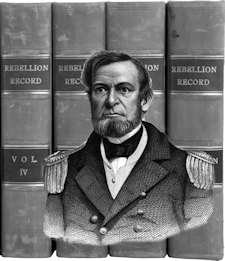January 10.—The Trenton (Tenn.) Standard, of this date, contains the following: “We regret to say that considerable evidence of disloyalty to the Confederate government has been manifested in some of the counties in West-Tennessee since the call upon the militia was made; one county (Carroll) having gone so far, we learn, as positively to refuse to submit to the detail. In Weakly county, also, we learn there was trouble on Monday last, which led to the fear that serious difficulties would occur there; but we understand that matters were settled peaceably and without bloodshed, which was at one time apprehended. In McNairy county, however, the disaffection seems to have reached its highest point, as we see from the West-Tennessee Whig that it was found necessary to send troops into that county to arrest some of the authorities, and to send detachments of soldiers into some of the other counties for the some purpose.”
 —At Louisville, Ky., the household effects ofGeneral Simon Bolivar Buckner were offered for sale in front of the Court-House. Quite a crowd assembled, among whom were a number of persons as rampant for “their rights” as a Southern sun could make them; but still among them all there were none—no, not one—who would come forward with the amount, settle the tax bill, and prevent the sale.
—At Louisville, Ky., the household effects ofGeneral Simon Bolivar Buckner were offered for sale in front of the Court-House. Quite a crowd assembled, among whom were a number of persons as rampant for “their rights” as a Southern sun could make them; but still among them all there were none—no, not one—who would come forward with the amount, settle the tax bill, and prevent the sale.
Mr. Thuxton, the collector, proceeded with the sale until sufficient money had been realized to pay the taxes on Buckner’s property in Louisville.—Louisville Journal, January 11.
—Colonel Garfield left Paintsville, Ky., yesterday, in pursuit of the flying rebels, and came up with them this morning, finding them posted on an eminence, two thousand five hundred strong, with three pieces of cannon. The fight lasted throughout the day, resulting in the defeat of the rebels, who were commanded by Humphrey Marshall About sixty rebels were killed, twenty-five taken prisoners, and ten horses with a quantity of stores captured. The principal engagement took place at the forks of Middle Creek, Ky., and the road to Prestonburg, only a few miles distant, was laid open.—(Doc. 11.)
An expedition under Generals Grant and McClernand, about five thousand strong, left Cairo, Ill, and started down the Mississippi River this afternoon. They went on the following boats: City of Memphis, Belle Memphis, Emerald with one barge, Fanny Bullitt, W. H. Brown, Alps with two barges, Keystone with two barges, Aleck Scott; and were from the Tenth Illinois regiment, Colonel Morgan; Twenty-seventh Illinois, Colonel Buford; Twenty-ninth Illinois, Colonel Reorden; Thirtieth Illinois, Colonel Fouke; Thirty-first Illinois, Colonel Logan; Forty-eighth Illinois, Colonel Kaynie; Eighteenth Illinois, Colonel Lawler; Fourth Illinois Cavalry, Colonel Dickey; and Captain Swartz’s Artillery, four guns.
They took five days’ cooked rations, about ninety wagons and four hundred mules, together with ambulances, tents, etc. They were landed on the Kentucky shore, eight miles below Cairo, near the mouth of Mayfield creek, and opposite Norfolk, Mo. Two gunboats—the Essex and St Louis, accompanied them.—Cincinnati Enquirer.
A party of Kansas Indians visited Leavenworth for the purpose of ascertaining in what manner and for how long a time they could enlist in the service of the United States Government. During their stay the Chief, Y-o-to-wah, delivered a speech in which he set forth the intentions of his fellows, and expressed the greatest desire to aid in the suppression of the rebellion.—(Doc. 12.)
—The First Kansas regiment, which was sent from Sedalia, Mo., arrived at Lexington and arrested several of the most prominent and active rebels of the town, captured and destroyed about fifteen hundred hogs, which were being packed for the use of General Price’s rebels, and took possession of a good deal of other valuable property.—National Intelligencer, January 16.
—In the United States Senate, the reports of the Judiciary Committee, in favor of the expulsion of Waldo P. Johnson and Trusten Polk, Senators from Missouri, were taken up and unanimously adopted. A copy of the resolutions for their expulsion was ordered to be sent to the Governor of Missouri.—New-York Times, January 11.
—The first auction sale of confiscated cotton from Port Royal occurred in New-York, under orders of the Government. There were seventy-nine bales in all, and the cotton sold at an average of nearly sixty cents per pound, with the exception of two out of the ten lots, (a very inferior quality,) which sold at eighteen and twenty-five cents respectively.


